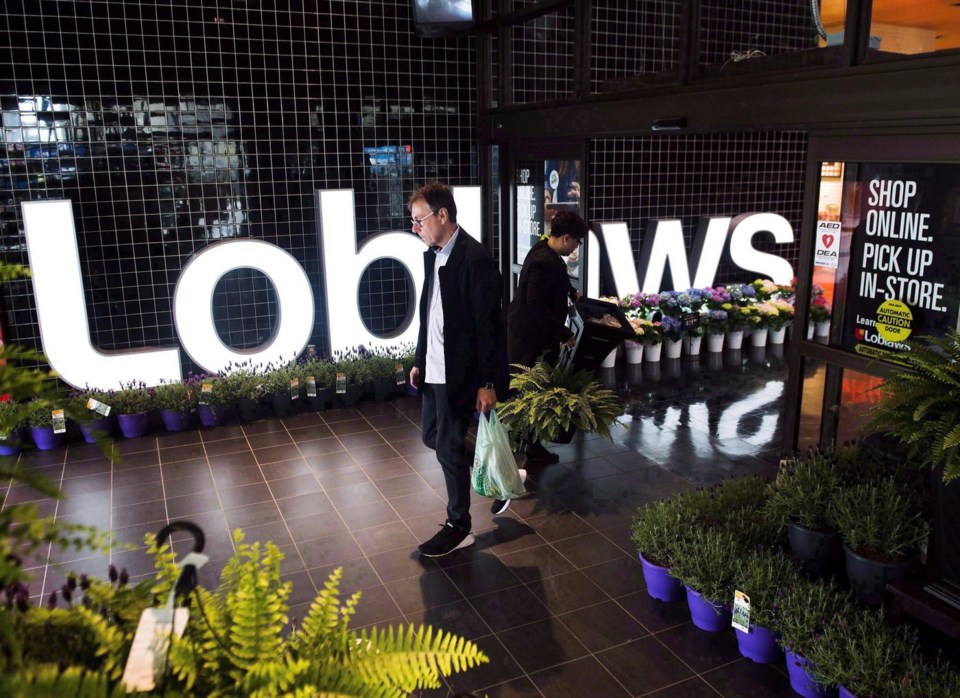Loblaw said a boycott of its stores during its latest quarter had a minimal impact, as the company attributed lower profits to a settlement over an alleged bread price-fixing scheme.
"The overall financial impact was minor," president and CEO Per Bank said of the boycott on a conference call with analysts to discuss the company's second-quarter earnings.
“Every single customer is important to us,” he said. “And one customer lost is one too many.”
Loblaw saw its profit decline 10 per cent year-over-year to $457 million, which it attributed primarily to the settlement of a pair of class-action lawsuits, to the tune of $500 million between it and parent company George Weston Ltd.
The company’s food retail same-store sales — which measures sales at stores open for at least one year — were almost flat, rising just 0.2 per cent over last year. That's compared with 3.4 per cent in the first quarter of the year.
Loblaw attributed that in part to the company's strong performance a year earlier, making it a tough comparison.
“Our sales in grocery were a little soft, mostly based on last year’s strong performance of 6.1 per cent growth,” said Bank.
“Aside from this, it’s hard to isolate one specific factor for the softness.”
RBC analyst Irene Nattel asked for more details, saying the food same-store sales number was “weaker than most of us expected.”
Richard Dufresne, the company’s chief financial officer, reiterated last year’s strong quarter, adding that the sales trend so far in 2024 is “pretty much the same.” He also said that this year’s “wet spring” compared with an “extremely hot” May last year may have been a factor.
Regarding the boycott, “we did notice a bit of an impact in certain stores in specific markets, but that said, at the end of the quarter, things have returned to normal,” said Dufresne.
An untold number of shoppers said they would boycott Loblaw-owned stores in May, with some calling for the action to continue indefinitely, to protest high food prices. Bank and Loblaw chairman Galen Weston previously pushed back on what they called "misguided criticism" of the company.
It noted in its earnings release that traffic in food retail increased during the quarter, while the average basket size went down.
Drug retail same-store sales increased 1.5 per cent, with front store same-store sales down 2.4 per cent and pharmacy and health-care services same-store sales up 5.4 per cent.
Dufresne said the company’s strategies, including promotions like Hit of the Month, seem to be working heading into the third quarter.
“Looking ahead, our Q3 is off to a stronger start. We are seeing improved same-store sales performance and positive tonnage.”
He said 2024 is bringing normalization to Loblaw’s retail business.
“The pandemic and the subsequent periods of high global food inflation are now behind us. As we compare performance this year versus last, we see our same-store performance slowing.”
Discount stores like No Frills and Maxi continue to outperform conventional stores, said Dufresne.
The company opened 14 new discount stores during the quarter, and Dufresne said they have 20 more planned for the third quarter.
Loblaw earned a profit available to common shareholders of $457 million or $1.48 per diluted share for the quarter ended June 15. The result was down from $508 million or $1.58 per diluted share in the same quarter last year, which the company attributed to the settlement.
Revenue for the quarter totalled $13.95 billion, up from $13.74 billion a year earlier.
On an adjusted basis, Loblaw says it earned $2.15 per diluted share in its latest quarter, up from an adjusted profit of $1.94 per diluted share a year earlier.
This report by The Canadian Press was first published July 25, 2024.
Companies in this story: (TSX:L)
Rosa Saba, The Canadian Press




